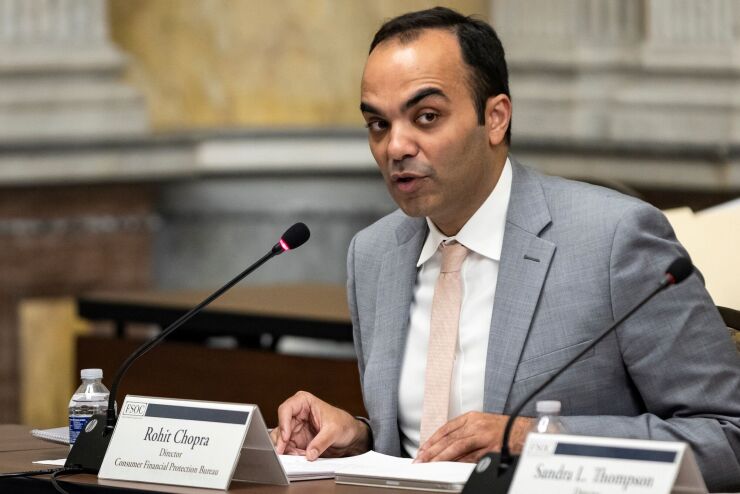
WASHINGTON — The Consumer Financial Protection Bureau Tuesday announced buy now/pay later lenders will be classified as credit card providers for consumer protection purposes under a new interpretive agency rule.
Under the 1968 Truth in Lending Act, credit card providers are required to adhere to certain standards, including disclosing lending terms and offering consumers the right to dispute charges and receive refund credits to their balances. CFPB director Rohit Chopra said the proposal would require buy now/pay later, or BNPL, offerings to adhere to those same standards.
"When Congress defined credit cards under the Truth in Lending Act decades ago, it deliberately defined the term to include devices both known and unknown," he said. "Essentially, any mechanism, tool or procedure that consumers can use from time to time to buy goods or services on credit, gets the protections that consumers have come to know and expect with credit cards."
The agency indicated that BNPL customers should receive clear disclosures detailing fees, pricing structures, and their rights when issuing billing disputes and requesting refunds on purchases. When facing a billing dispute, CFPB said consumers should also be able to escalate the issue to the buy now/pay later lender, who must then investigate and issue a credit if necessary. Like with credit cards, Chopra added that consumers should not be required to make payments on the loan in question until the dispute is resolved.
Chopra has long been interested in the credit implications of BNPL firms. In 2021 — within months of being sworn in —
"Buy now, pay later is the new version of the old layaway plan, but with modern, faster twists where the consumer gets the product immediately but gets the debt immediately too," Chopra said when the RFI was issued.
Buy now/pay later loans,
The agency
"Given the growth in outstanding consumer credit and the rise in new forms of credit," Chopra said, "We're going to continue to carefully monitor these markets and take action to ensure that consumers are being treated fairly."
The CFPB said while it is taking comment on what requirements ought to apply to BNPL firms, it is not putting forward any specific regulatory requirements with Tuesday's interpretive rule. The agency is taking comments through August 1.






